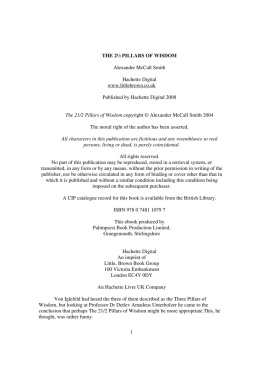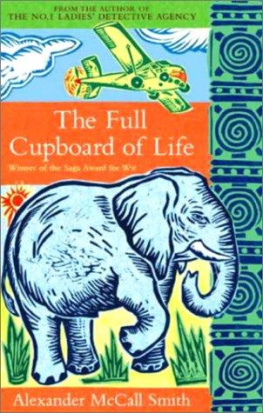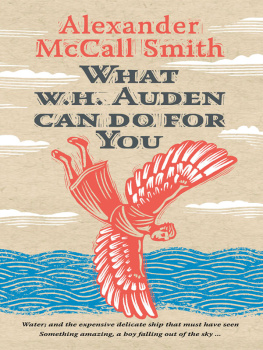HEAVENLY
DATE AND OTHER FLIRTATIONS ALEXANDER
McCALL SMITH

CONTENTS
H err Bruglis bedroom was in the front of his mansion, looking out over the waters of the Lake of Zrich. In the early mornings he would stand in his dressing gown at the window, sipping a cup of milky coffee, while his valet ran his bath. The valet, Markus, was Polish, and had been with Herr Brugli for fifteen years. He knew the exact temperature which Herr Brugli preferred for his bath water; he knew the precise blend of coffee which his employer liked in the morning and the place on the breakfast table where Herr Brugli expected the mornings copy of Die Neue Zricher Zeitung to be awaiting him. Markus knew everything.
Markus knew, too, that Herr Brugli liked Madame Verloren van Thermaat, a Belgian lady who lived two miles away, also on the shores of the lake, also in a mansion. Verloren van Thermaat what a ridiculous name, he thought. Madame Lost Tomato, thats what I call her!
Should I marry Madame Thermaat? Herr Brugli asked him one day, as he brought in the morning tray. What are your views, Markus? You know me well enough by now. What do you think? Should a widower like myself marry a widow like Madame Thermaat? Do you think that thats what people expect of us?
Markus laid his tray on the bedside table, exactly where Herr Brugli liked it to be laid. Then he crossed the room to open the curtains, glancing as he did so at his employers face, reflected in the wardrobe mirror. Markus had to admit to himself that he was frightened. Everything about his job was to his liking. There was very little to do. He was paid handsomely by Herr Brugli, who never counted the bottles in his cellar, ever. He and his wife lived in a small cottage in the grounds, not more than a few paces from the private jetty. They had a small boat, which they liked to sail in the summer. Madame Thermaat might change all that. She had her own staff. She might edge them out.
I really couldnt say, sir, he said, adding: Marriage is not always a bed of roses, of course. Some people are happier by themselves.
He saw Herr Brugli smile.
Anyway, perhaps I anticipate matters rather. Madame Thermaat is an independent person. Her life is very satisfactory at present.
Now Herr Brugli stood before the mirror in his dressing room and adjusted his tie. He was wearing his most comfortable suit, made, like all his suits, in London. Every year he went there for his wardrobe, ordering several suits and pairs of handmade shoes. Nobody made clothes like the English, he thought, which was rather surprising, bearing in mind what a scruffy group of people they were in general young people in blue jeans with tears in the knees; men in shapeless, shiny jackets with zips in front; women in unflattering trousers and everyone, it seemed, in running shoes! And yet they made those wonderful clothes for other people tweeds, cords, mohairs, checks, tartans.
This suit was just right for the occasion. It was made of a thick brown tweed, with a double-breasted waistcoat, and would keep him warm if the day turned nasty, although that looked unlikely, he thought; the sky was quite clear and there were signs of spring everywhere. It would be a perfect day.
He ate his breakfast slowly, perusing the columns of the newspaper, noting the obituaries nobody today, thank God finally turning to the stock reports. There was satisfactory news there, too. Everything was up on the previous days trading, which is how it should be.
He laid aside the paper, wiped his mouth on the starched table napkin which Markus had patiently taught the Italian maid to iron in just the right way, and then he got up from the table. There was a short time to wait before the car would be at the door and he would set off. For a moment he was unsure what to do. He could write a letter, or read perhaps he was half-way through The Magic Mountain , but he was out of sympathy with it for some reason.
German literature was so depressing, he felt; so heavy and full of woe. What a bleak vision they have, our neighbours to the north; what a frightful group of people for the most part, terribly greedy. But they eat our chocolates, I suppose.
He went to his bureau and took out his writing case. There was a letter to be written to his cousin in Buenos Aires. She wrote to him once a month, and he always wrote back within three days of receiving her letter. She had nothing to do, of course, and her letters reflected this; but he was dutiful in family matters and since he had been left on his own the burden of correspondence had fallen on him.
Dear Hetta: What a gorgeous day it is today a real peach of a day. The lake is still, and there is no movement in the air. Yet spring is here, I can feel it, or almost here, and very soon we shall have blossom in the garden again! Alas, you will slide into autumn, and winter then, but I shall think of you as I sit in the garden.
He paused. She knew about Madame Thermaat, of course, but he did not want her to feel that there was any understanding which did not yet exist. Perhaps just a mention then: Today I am accompanying Madame Thermaat I have told you of her, of course into Zrich. We are going to take a short walk by the river, as it is such a lovely day, and I have one or two matters to attend to. Then we shall come back. He wondered if he should say more, but decided that this was quite enough. Let them speculate in Buenos Aires if they liked.
Markus came in to tell him that the car was ready outside. He got up from his desk and walked into the hall. There was another mirror there, and he looked anxiously at his reflection. The tie needed straightening, but he was sure he was right about the suit it was exactly what the day required.
Good-bye Markus, he said. I shall be back at the usual time.
Markus held the door open for him, and the driver, seeing him emerge, started the engine of the car. They moved out on to the road, into the traffic, and edged their way up the lake to collect Madame Thermaat.
My dear Madame Thermaat!
Dear Herr Brugli!
They beamed at one another.
Would you like the rug across your knees? Theres still a bit of a nip in the air, isnt there?
She shook her head. I am perfectly warm, she said. I never feel the cold.
You are so fortunate, he said. I feel cold in summer.
Thin blood, she said. You must have thin blood.
He laughed. I shall try to thicken it up. What do you recommend? Do any of those health magazines you read tell you how to do it?
Chocolate, Herr Brugli! Lots of chocolate!
He wagged his finger at her in mock disapproval. They were well on their way to Zrich now, and the large, high-powered car shot past slower vehicles. He asked her what she had been doing, and she described her week. It had, she said, been trying: she had two meetings of the village board, and they had ended in an impasse on each occasion, which was worrying. And then she had had three bridge evenings three all of which meant that she had had no time to herself at all.
He nodded sympathetically. He had weeks like that himself.
And you have your factories too, she said. You have to worry about them.
To an extent, he agreed. But thank heavens for my managers.
The car turned over the Cathedral Bridge and into the heart of the city. At the end of Bahnhof Strasse it pulled in to the side and allowed them both to alight. He got out first and held the door open for his companion.
Thank you dear Herr Brugli, she said. Now, where shall we start?
He wagged his finger at her again.
You know very well, he scolded. Sprunglis as always!
They crossed the street and walked a few yards to a large glass door on which in ornate gold script the name Sprunglis was embossed. They walked past a man sitting on a bench, whose eyes fixed on them as they went past. He muttered something, and held out a hand, but neither heard nor saw him.
Next page










 CONTENTS
CONTENTS